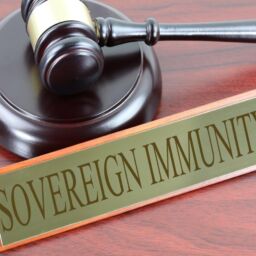“When law and morality contradict each other, the citizen has the cruel alternative of either losing his moral sense or losing his respect for the law.”
– Frederic Bastiat
LAW OF TORT AND MORALITY
A tort is a civil wrong that results from an act or omission, other than a breach of contract, that causes injury or harm to another for which courts impose liability. In other words, a wrong has been committed and the remedy is money damages to the person wronged and the law governing the wrongs and providing the remedy against it is, law of tort. Morality on the other hand, is basically the social principles that define what is morally right and morally wrong. In brief, it is the moral code of conduct of a particular person. The main aspect that helps to decipher whether an act is right or wrong as per ethics or morals is the ultimate intention of the person committing that particular act. To put it precisely, the concept of morality is concerned with both the external acts and internal motives for that action or occurrence. However, morality or ethics strongly influence the emergence of laws as well. For instance, the crimes and other actions identified as illegal under the law are those that are identified as immoral by virtue of the values of the society as when a law is being made or a judgement is being passed, the societal values are kept under scrutiny as laws exist to serve the society. Therefore, the foundation for the creation of laws is morality.
SIGNIFICANCE OF MORALITY IN LAW OF TORT
Law of tort comes into play whenever a person is wronged at the hands of another person, the wronged person being termed as ‘plaintiff’ and the wrongdoer being termed as ‘defendant’. The purpose of the law of tort is to right the wrong suffered by the plaintiff by bringing him into the same position as he was before the commission of the tort by way of compensation. Fletcher views tort liability in terms of two factors: did the defendant offer a non-reciprocal risk to the plaintiff, and was the defendant’s action justified? The second point, whether the defendant’s act was justified relates to the angle of morality in the law of tort in the aspect that whether the act committed is so gross misconduct that it could not be justified whatsoever. Among the mass of doctrines, holdings, principles, and institutional arrangements that we associate with law of tort, are the features that are constitutive of our conception of tort law. The systemic absence of these features would baffle our identification of what remained as tort law at all. Whatever the degree of morality in tort law, it is necessarily the morality of these constitutive features. It is very well established that one can only be held accountable for what one has done, and otherwise one is presumed to be innocent. In the same way, legal protections against private wrongdoing both sharpen the contours of the rights that are at stake and make them into a consistent set. Because of the importance of human freedom and the unique responsibility that each individual bears for his or her own life, the rights in question are in jeopardy. And, all these are pillars of morality, that a person should not be wronged by another person with respect to his freedom or reputation or dignity, for that matter.
EXPLAINING THE ROLE OF MORALITY IN TORT CASES
Defamation is a tort, wherein a person defames another person and intends to bring bad repute to his name by publishing such statement, the remark being false and puts the person down in the eyes of the right thinking people of the society, either by speaking such defamatory statements, known as slander, or by writing such statements, known as libel, or by such visual representation or indirect remark, known as innuendo. Now, defamation in the sense of morality is obviously wrong based on ethics and something that is not expected to be done against others. The right protected herein, is the right of reputation. For example, in Cammish v. Hughes, the Court of Appeal concluded that a charge of serious incompetence against a businessman was sufficient to meet the necessary threshold. Such a supposition “was capable of having an impact on his livelihood. A businessperson’s reputation is vital because he must persuade others that he will competently fulfil promises made and perform commitments entered into in the course of business.”
There are a bunch of physical torts too, against which a person is to be protected and compensated in case of the commission of the tort such as, negligence, wherein the defendant by his rash and negligent act causes harm or injuries to the plaintiff and then in order to make good the injuries, has to compensate him. A private nuisance is a tort, that is, a civil wrong. It is about interfering with a person’s enjoyment and usage of his property. The law recognises that landowners, or people in legal possession of land, have a right to the property’s undamaged condition as well as appropriate comfort and ease in its use. The most prevalent form of redress for annoyance is monetary damages. In some cases, an injunction or a stay of execution may be appropriate. An injunction is a court order that directs a defendant to stop, remove, restrain, or restrict a nuisance, or to abandon plans for a threatened nuisance. In addition to abatement or injunctive remedies, a fine or punishment may be issued in public nuisance proceedings.
CONCLUDING REMARK
When we see at a glance, the relationship between the law of tort and morality, we find that they both are intertwined either directly or indirectly. Whenever a person is wronged, he is compensated to bring him back to an uncompromised standing as he was before. The purpose of tort law, in its most basic form, is to protect society from anarchy and pandemonium by establishing a court where one person can file a claim against another without resorting to private revenge.
Unlike other types of litigation, such as contract and real estate, tort law examines issues such as a party’s loss of dignity when pursuing a claim for personal harm. In many cases, the genesis of a claim is the humiliation of being used or duped. This approach allows a civil court of law to weigh pain and suffering, as well as other sorts of emotional distress, when reaching a decision. Therefore, the assumption that the law of tort deals with morality stands true because values are the life-blood of laws, either in criminal law, law of tort or any laws for that matter that exists.
Author(s) Name: Ekta Agarwal (Student, National Law University and Judicial Academy, Assam)











